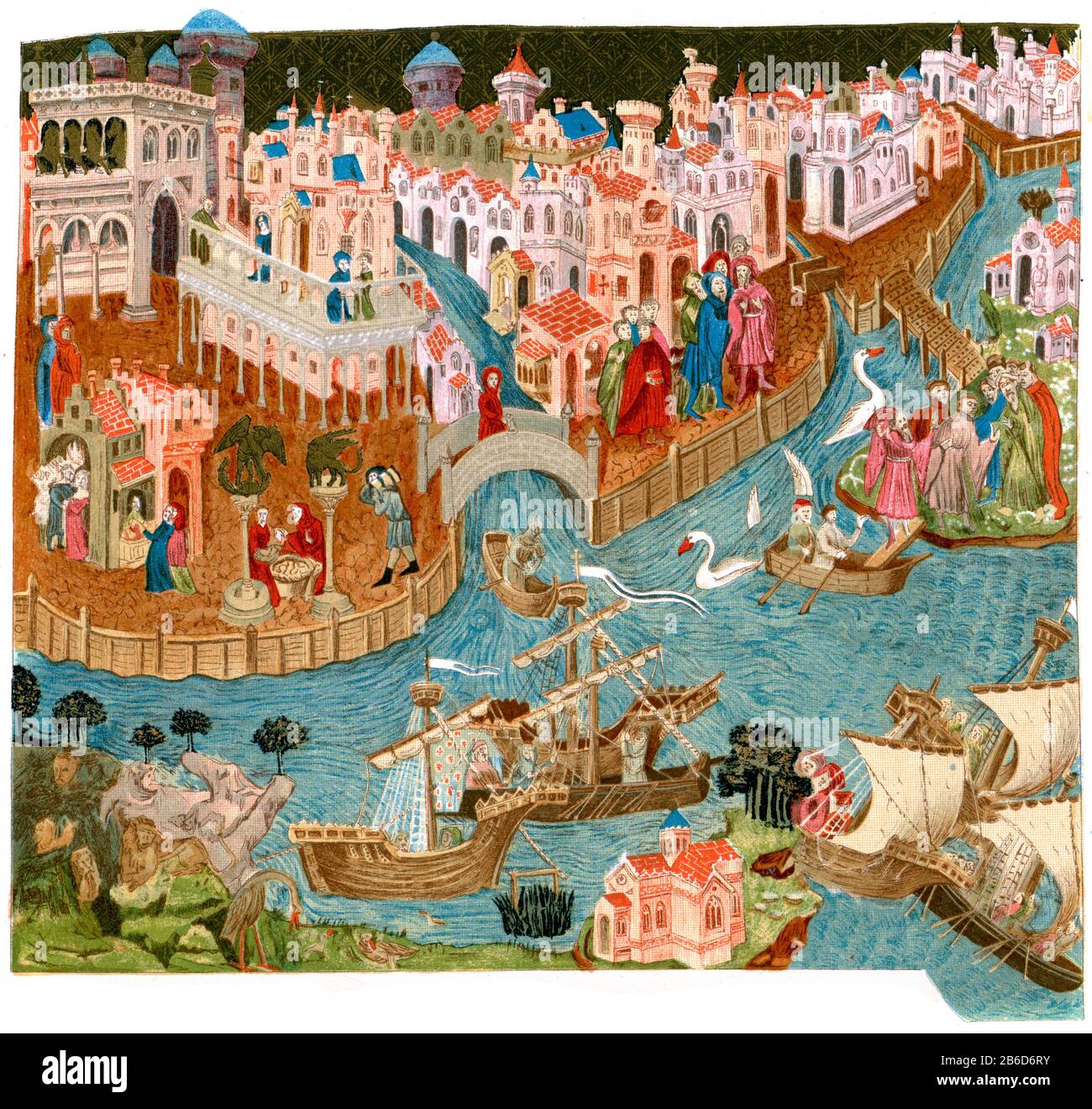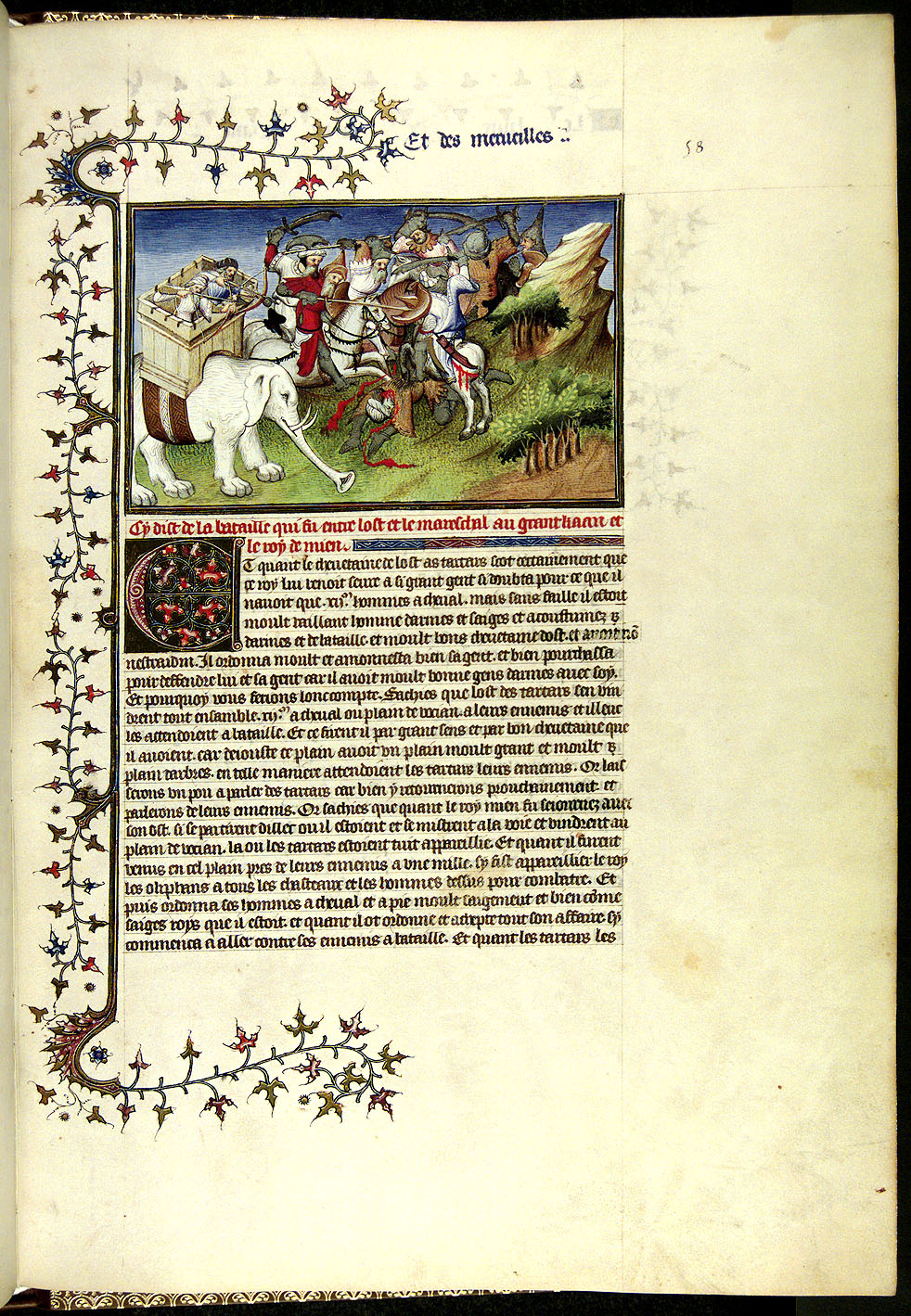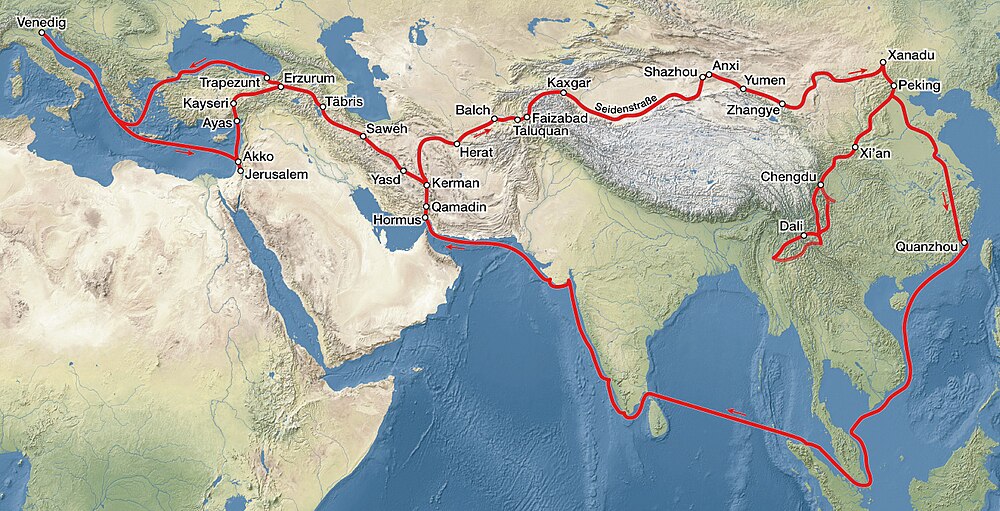His account of his experiences is one of the most important travel documents. While imprisoned in Genoa, Marco Polo related the story of his travels to. The only record of his 13th-century odyssey through the Far East is the hot air of his own Travels, which was actually an “as. According to Marco Polo's. Marco Polo’s Travels Along the Silk Road Marco Polo in Venice Marco Polo (1254-1324) was a Venetian merchant believed to have journeyed across Asia at the height of the Mongol Empire.
- 1260 1295 Marco Polo Travels To Asia Free
- 1260 1295 Marco Polo Travels To Asia 2017
- 1260 1295 Marco Polo Travels To Asia 2
- 1260 1295 Marco Polo Travels To Asia 2016
- 1260 1295 Marco Polo Travels To Asia
Marco Polo Essay, Research Paper
MARCO POLO
Marco Polo isone of the most well known heroic travelers and traders around theworld. In my paper I will discuss with you Marco Polo s life, histravels, and his visit to China to see the great Khan. Marco Polo wasborn in 1254 in Venice. He was a Venetian explorer and merchant whoseaccount of his travels in Asia was the primary source for theEuropean image of the Far East until the late 19th century. Marco’sfather, Niccolo, and his uncle Maffeo had traveled to China asmerchants. When they left Venice to return to China, they wereaccompanied by 17 year old Marco and two priests.

Early life,despite his enduring fame, very little was known about the personallife of Marco Polo. It is known that he was born into a leadingVenetian family of merchants. He also lived during a favorable timein world history, when the height of Venice s influence harmonizedwith the greatest extent of Mongol conquest of Asia. Ruled by KublaiKhan, the Mongol Empire stretched all the way from China to Russiaand the Levant. The Mongol crowds also threatened other parts ofEurope, particularly Poland and Hungary, inspiring fears everywhereby their ruthless advances. Yet the ruthless methods brought ameasure of stability to the lands they controlled, opening up traderoutes. Into this favorable atmosphere a number of European tradersventured, including the family of Marco Polo. The Polos hadlong-established ties in the Levant and around the Black Sea: forexample, they owned property in Constantinople. Around 1260, Marcosuncle, Maffeo, and Marco s father, Niccolo, made a trading visit intoMongol territory, the land of the Golden Horde, ruled by Berke Khan.While they were there, a war broke out between Berke and the Cowan ofLevant, blocking their return home. Thus Niccolo and Maffeo traveleddeeper into Mongol territory, moving southeast to Bukhara, which wasruled by Cowan.
In 1269, Niccoloand Maffeo Polo arrived back in Venice, where Niccolo found out hiswife had died while he was gone. Their son, Marco, who was only aboutfifteen years old, had been only six or younger when his father lefthome: thus; primarily his mother and the streets of Venice rearedMarco. Then his father and uncle suddenly reappeared, after nineyears of traveling. These experiences were the very finest influenceson Marco, and one can see their effects mirrored in his character: acombination of sensitivity and toughness, independence and loyalty,motivated by an eagerness for adventure, a love of stories, and adesire to please or impress.
Marco wasseventeen years old when he, his father and uncle finally set out forthe court of Kublai Khan. They were accompanied not by one hundredwise men but by two Dominican monks, and the two good monks turnedback at the first sign of misfortune, another local war. Aside fromthe pope s messages, the only spiritual gift Europe was able tofurnish the great Kublai Khan was oil from the lamp burning at JesusChrist s supposed tomb in Jerusalem. Yet, in a sense, Marco, the onlynew person in the Polos party, was himself a fitting delegate of thespirit of European civilization on the eve of the Renaissance. Thelack of one hundred learned Europeans guaranteed that he would catchthe eye of the Cowan, who was curious about Latin s .
On the way tothe khan s court, Marco had the opportunity to complete hiseducation. The journey took three and a half years by horsebackthrough some of the world s most rugged terrain, including snowymountain ranges, such as the Pamirs, and parching deserts. The grouptraveled numerous countries and cultures, noting food, dress, andreligion unique to each. In particular, under the khan s protectionthe Polos were able to observe a large portion of the Islamic worldat close range. By the time they reached the khan s court inKhanbalik, Marco had become a hardened traveler. He had also receiveda unique education and had been initiated into manhood.
Kublai Khangreeted the Polos warmly and invited them to stay on in his court.The Polos became great favorites of the khan, and Kublai eventuallymade Marco one of his most trusted consuls. For political reasons,the khan was in the habit of appointing foreigners to administerconquered lands, particularly China, where the tenacity of theChinese bureaucracy was legendary. Finally, Marco reported back sosuccessfully from his first mission informing the khan not only onbusiness details but also on customs and other interesting triviathat further appointment was confirmed. The Polos stayed on forseventeen years, another indication of how valued they were in thekhan s court. Apparently, the elder Polos carried on their tradingwhile Marco was performing his missions; yet seventeen years is along time to trade without returning home to family and friends.According to Macro, because the khan held them in such high regard,he would not let them return home.
As the khan agedthe Polos began to fear what would happen after his death. Finally anopportunity to leave presented itself when trusted emissaries wereneeded to accompany a Mongol princess on a wedding voyage by sea toPersia, where she was promised to the local khan. The Polos sailedfrom Cathay with a fleet of fourteen ships and a wedding party of sixhundred people, not counting the sailors. Only a few members of thewedding entourage survived the journey of almost two years, butluckily the survivors included the Polos and the princess.Fortunately, too, the Polos duly delivered the princess not to theold khan of Persia, who had meanwhile died, but to his son.
From Persia, thePolos made their way back to Venice. They were robbed as soon as theygot into Christian territory, but they still managed to reach home in1295, with plenty of rich goods. Having thought them dead, theirrelatives at first did not recognize them, then were astounded, andthen were disgusted by their shabby appearance. Yet, the scornchanged to delight when the returned travelers invited everyone to ahomecoming banquet, ripped apart their old clothes, and let all thehidden jewels clatter to the table.
The rest of theworld might have learned little about the Polos travels if fate hadnot intervened in Marco s life. In his early forties, Marco was notyet ready to settle down. He became involved in naval warfare betweenVenetians and their trading rivals, the Genoese, and was captured. In1298, he found himself rotting in a prison in an experience thatcould have ended tragically but instead took a lucky turn. In prisonMarco met a man named Rustichello from Persia, who was a writer ofromances. To pass the time, Marco dictated his observations aboutAsia to Rustichello. Their book was soon circulating, since Marcoremained in prison only a year or so, very likely gaining his freedomwhen the Venetians and Genoese made peace in 1299.
After his prisonexperience, Marco was content to lead a quiet life in Venice with therest of his family and bask in his almost instant literary fame. Hemarried Donata Badoer, a member of the Venetian aristocracy. Marcodied in 1324, only seventy years of age. In his will he left most ofhis modest wealth to his three daughters, a legacy that includedgoods which he had brought back from Asia.
Born: c. 1254
Venice
Died: January 8, 1324
Venice
Venetian explorer and writer
The traveler and writer Marco Polo left Venice for Cathay (now China) in 1271, spent seventeen years in Kublai Khan's (1215–1294) empire, and returned to Venice in 1295. His account of his experiences is one of the most important travel documents ever written.
Family business

Born into a noble family of Venetian merchants, Marco Polo began his long experience with Cathay through the adventures of his father, Niccolo, and his uncle, Maffeo Polo, partners in a trading operation at a time when Venice was the world leader in foreign commerce. The Polos had left Venice to travel all the way to Peking, China, and back when Marco was only six years old. During their nine-year absence, Marco was raised by his mother and other members of his extended family. He became a tough, loyal, observant young man, eager to please and interested in adventure.
Marco Polo's father and uncle were well received in China by the Mongol prince Kublai Khan in 1266. The Polos impressed Kublai Khan with their intelligence and their knowledge of the world. For these reasons he kept them around for several years. In 1269 he sent them to Rome as his messengers with a request that the pope send one hundred Europeans to share their knowledge with him. Although the pope did not grant the request, the Polo brothers, in search of further profit and adventure, set out to return to China in 1271. Since his mother had died recently, Marco Polo was taken along on the trip, marking his debut, or first appearance, as a world traveler at age seventeen. The return to China, over land and sea, desert and mountain, took slightly more than three years.

Despite their failure to bring back the one hundred Europeans from Rome, Kublai Khan welcomed the Polos back and again took them into his service. He became increasingly impressed with Marco Polo, who, like his father and uncle, demonstrated not only his ability to travel but also his knowledge of the Mongol language and his remarkable powers of observation.
Courtesy of the .
1260 1295 Marco Polo Travels To Asia Free
Years in China
With the approval of Kublai Khan, the Polos began widespread trading ventures within his empire. While on these business trips around the empire, Marco Polo demonstrated his quick mind and his ability to relate what he saw in clear, understandable terms. His reports, which formed the basis of his famous account of his travels, contained information on local customs, business conditions, and events. It was in these reports that he displayed his talent as an objective and accurate observer. Kublai Khan read and used these reports to keep informed of developments within his empire.
1260 1295 Marco Polo Travels To Asia 2017
All three of the European visitors were kept on as messengers and advisers. The younger Polo was used on several extended missions that sent him traveling over much of China and even beyond. By his own account he came near the edge of Tibet and northern Burma. This relationship between the Polos and Kublai Khan lasted more than sixteen years, during which Marco served as Kublai Khan's personal representative in the city of Yangchow, China.
Leaving the khan
Although the Polos enjoyed the profits of their enterprise, they longed to return to Venice to enjoy their wealth. They were prevented from returning for a time because Kublai Khan was unwilling to release them from his service. Their chance to return to Europe came in 1292, when they were sent on a mission to Persia and then to Rome. The assignment represented Kublai Khan's way of releasing them from their obligations to him. In Persia they were to arrange a marriage between one of Kublai Khan's regional rulers and a Mongol princess. They were forced to remain in Persia for nearly a year when the man who was supposed to be married died and a new groom had to be found. From the Persian court, the Venetians continued their journey home, arriving in 1295 after an absence of nearly twenty-five years.

1260 1295 Marco Polo Travels To Asia 2
Marco Polo did not return to Asia again. He entered the service of Venice in its war against the rival city-state of Genoa. In 1298 Marco served as a gentleman-commander of a ship in the Venetian navy. In September 1298 he was captured and imprisoned in Genoa. He was famous for his adventures, and as a result he was treated with unusual courtesy for a prisoner and released within a year. Little is known of Marco Polo's life after his return to Venice. He apparently returned to private life and business until his death in 1324.
Record of his travels
While imprisoned in Genoa, Marco Polo related the story of his travels to a fellow prisoner named Rusticiano, a man from Pisa, Italy, who wrote in the romantic style of thirteenth-century literature. A combination of Marco Polo's gift of observation and the writing style of Rusticiano emerged in the final version of Marco Polo's travels. The book included Polo's personal remembrances as well as stories related to him by others.
1260 1295 Marco Polo Travels To Asia 2016
In his book, which was translated into many languages, Polo left a wealth of information. The information contained in his maps has proved remarkably accurate when tested by modern methods. His observations about customs and local characteristics have also been proven true by research.
For More Information
Collis, Maurice. Marco Polo. London: Faber and Faber, 1950.
1260 1295 Marco Polo Travels To Asia
Larner, John. Marco Polo and the Discovery of the World. New Haven, CT: Yale University Press, 1999.
Latham, Ronald. The Travels of Marco Polo. Middlesex, England: Penguin Books, 1958.
Stefoff, Rebecca. Marco Polo and the Medieval Explorers. New York: Chelsea House Publishers, 1992.